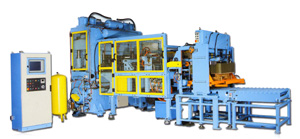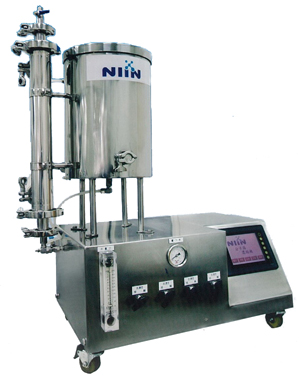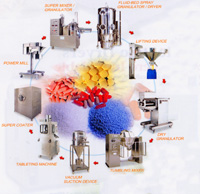Appetite for Food-processing Machinery in Asia Grows With Booming Economy
2008/04/07 | By Ben Shen | YENCHEN MACHINERY CO., LTD.Strong demand for all sorts of food-processing machinery in Asia, fueled by rapid economic expansion of Asian countries, has been drawing increasingly more suppliers and exporters into this sector of manufacturing. Taiwan, already globally-renowned for being a major exporter of all kinds of machinery, also turns out a host of food-processing equipment, including ones that process foods and drinks; bake, package, chill, freeze and cook foods; dispose of waste; sanitize or clean foods and food-preparation facilities; are integrated with CAD & CAM (computer aided design and manufacturing) systems; analyze and measure; as well as restaurant equipment, and vending machines.
Specialized Platform
The Taiwan Food & Pharmacy Machinery Manufacturer's Association chairman Ching-san Liu notes that Taiwan is a relatively specialized platform serving the global food industry, especially in light that Taiwan-based manufacturers in this field are capable of developing a wide range of tailor-made products, with Taiwan makers mainly exporting machinery that make pastries; seal packages; processes hot drinks and foods; and handle wheat products.
Although already supplying a considerable range of food-processing machinery, Taiwan-based makers in this line have been, as in other manufacturing sectors who try to upgrade for enhanced competitiveness and added-value, striving to continue developing machinery that meet more complex, sophisticated demands from food suppliers and processors worldwide. Some makers have even employed the most advanced aerospace technology to enhance mechanical reliability and functionality.
Canning Machinery for Food Processing
Shin-I Machinery Works Co., established in 1956, is one of Taiwan's oldest machinery designers and manufacturers, and has accumulated significant experience in developing metal-packaging machinery, especially for food canning.
Over the past five decades, the CE mark- and ISO9001-certified company has been dedicated to developing and producing innovative machinery and related equipment for can-making and canning. Starting from the production of punching dies, semi-automated can-making machines and mushroom processing machinery, the company has diversified into producing automatic can-making machinery. Its seasoned expertise and considerable production capacity enable it to turn out fully-integrated turnkey lines of high-speed automated machinery and equipment to meet the ever-changing demand of the can-making sector.
With a committed program to develop innovative machinery, the company already has built over 200 models, most of which are made-to-order. In fact the company says it concentrates on filling small orders for a variety of products.
For the past five decades and unlike many of its peers, Shin-I has never pondered relocating to places claiming to offer cheap labor and plentiful land, for perhaps one simple reason: "As we focus on producing a variety of products in small quantities, we have to rely on reliable support from peripheral partners for supplies of high-quality components and parts."
The company says that it would never compromise its product quality for the sake of upholding the highest safety standards: using only stainless steel and bronze to stamp out food cans that effectively resist acids, alkalis and corrosion.

Maximized Staff Comfort
Headquartered in Chingshui, Taichung County, central Taiwan, Shin-I runs an integrated production facility that is well-ventilated to achieve both maximum production staff comfort, hence effectively enhancing productivity.
Backed by a team of seasoned technicians who form the backbone of its solid R&D department, the company is fully capable of meeting customers' demands for made-to-order products. To stay updated to the latest trends in the industry, the company occasionally sends its own R&D people overseas for training that would upgrade their skills in design, manufacturing, etc.
"Poised as one of Taiwan's most experienced machinery manufacturers, we are proud of our ability to design state-of-the-art products," says H.H. Lin, the company's vice president. "Towards such end, we employ a series of advanced machine tools to fabricate critical components and parts to be installed in our machines, with only processing and machining of semi-finished or rough parts being outsourced."
Integrated-turnkey-equipment Capable
For instance, the company boasts that it can roll out integrated turnkey equipment to make three-piece cans, except the electric-resistance equipment; while the company supplies not only turnkey equipment but also single machines for the food processing industry according to customers' specific requirements.
Shin-I is very proud of having introduced the automatic CNC sheet feeding press in mid-2006, which is the company's latest machine. Integrated with a tri-axial synchronized movement mechanism, a servomotor, an electronic cam-control system and a Japanese-made PLC (programmable logic control) system, this model is ideal for tin or aluminum end-stamping. It is also equipped with a reliable industrial computer as the main control unit for date calculation, transmission and display.
The year 2006 also saw the company introduce an automatic transfer press specially designed to produce top ends for aerosol cans, caps and threaded ends. This press can be built for single or double-lane operation depending on the size of ends, with the maximum number of the tooling being nine stations for each lane, and the capacity being 100 to 150 strokes-per-minute and a maximum of 300 units-per-minute. Raw materials are fed into the in-feed screw or magnetic separator via a conveyer, while its reciprocating end-feeding system is equipped with several elastic fingers to send ends into the tooling.
Shin-I boasts over 95% of its output are exported. Since 1965, the company has exported machinery to the Philippines, after which the company has been successful in setting foot in various global markets. At present, Asia accounts for 60% of its exports. Thanks to the booming economic development in mainland China, the company currently sells 38% of its overall exports to that lucrative market. "Over the past two years, we have seen our sales to China steadily rising," says Lin. "Our sales growth in the mainland can be attributed to China's increased demand for milk-powder can-making equipment with people there becoming more health-conscious."
Thailand Another Booming Market
Thailand is proving to be another market with explosive growth as its aquaculture and agriculture sectors are generating considerable demands for metal cans: currently Thailand accounts for some 18% of the company's overall exports.
Up to date, Shin-I has exported its products to more than 70 nations and regions worldwide. It has established overseas sales agents in South Korea, Thailand, Indonesia, Spain and the Philippines. The company believes such emerging markets as Ukraine, Russia and some others in Latin America will be very promising in the next few years.
Adopting Aerospace Technology
NIIN Machinery Technology Co. is one of Taiwan's specialist manufacturers of machinery handling pharmaceuticals and biotech materials and ingredients, with the management having accumulated over 18 years of development and manufacturing experience. Years of developmental experience has allowed the company to adopt cutting-edge technologies as part of its portfolio: even tapping aerospace technology in manufacturing to improve product quality.
The company uses direct-drive system on its products, rather than conventional belt drives to reduce mechanical noise, with such features among others built into its line of equipment to help customers reduce production costs and raise productivity effectively.
Famed for its own "NIIN" brand in Southeast Asia, the company, located in Hsinying of Tainan County, southern Taiwan has a team of seasoned technicians specializing in designing automated machinery destined for the biotech, pharmaceutical, food and chemical sectors, an effort made possible mainly by referring to field manufacturing data based on empirical information gathered over the years. With the assistance of the experienced team, the company is capable of developing innovative products to meet customers' specific requirements. The company also offers turnkey equipment and technical services that are designed to help customers install reliable production lines.

Five Main Product Groups
At present, NIIN's major product lines can be divided into five categories, including tablet and granule production equipment (mixer, mix granulator and dryer series), fluid production equipment (extraction, concentration and sterile series), equipments of barrel and through (fermented tank, bacterium tank, formulation tank and finished product tank), vacuum homogeneous mixer, and membrane filtration concentration equipment.
The mix granulator plus vacuum dryness granulator is suitable for producing hormone, antibiotic, etc. It can combine with the vacuum system, drying system, mixing system and granulating system for closed-end automated production, which can help to reduce contamination during manufacturing. The production equipment is suitable for mixing and producing hormone, antibiotic and industrial chemical powders used in the medical, Chinese herbal therapy, and biotech fields.
In January, the company debuted some innovative products to diversify its product lines, including membrane filtration concentration equipment, crush-type granulator, and tablet-alignment machine.
The membrane-filtration concentrator can help achieve certain concentrations by separating moisture from substances with high rates of acceptability throughout low-temperatures. The equipment also features excellent filtration stability, good recycling ability, effective purification of specific biomolecules.
Automation Focused
The company says it is dedicated to producing automated machines, for which it has an in-house R&D team aimed at enhancing mechanical functionality, as well as developing advanced materials suitable for the machines. "We have to employ durable materials to fabricate key components in our machines," says Alex Shen, the company spokesman. "Our ultimate target is to develop machines capable of running all day long without breakdown." As such, Shen explains, using tough materials and specifically key parts that are annealed allows machines to run not only at high-speed, but do so stably.
Knowing that the durability of welded parts are only as good as the integrity of welds, while weld quality decides the overall mechanical quality, the company adopts in-house automated laser welders to maximize the quality of intricate welded parts: Shen says that such automated laser welders can help extend the life of welded parts.
The company claims that its products meet global CGMP and PICS standards, as well as the more commonplace FDA caliber. While most manufacturers in this line can meet the CGMP standard, few can roll out machines complying with the stricter PICS used for the water-injection system.
Another expertise held by the company is the adoption of the 21 CFR PART 11 standard in the automated control interface. NIIN Machinery Technology says that only well-established foreign firms in industrialized nations adopt such strict standards due to relatively higher costs. The company is capable of, backed by such expertise, rolling out made-to-order products with stringent specifications.
The company says it is looking for qualified agents overseas to fully develop export opportunities, with "qualified" meaning that agents would have to effectively handle service and inquiry issues of technical nature. And despite its focus on mechanical automation, the company also offers technical service: supplying technicians who can debug occasional faulty processing steps.
Cutting-edge Drug-making Machinery
Yenchen Machinery Co. is one of the most specialized makers of advanced food processing equipment in Taiwan; while the company has a solid reputation as a maker of quality machinery for the pharmaceutical sector.
Sam Lo, one of its sales representatives, says Yenchen's pharmaceutical machinery could be used for drying, granulation, and pill coating. The coating process is incredible: the machine suspends fine powder in the air, which is spray-coated with a binder allowing such powder to coalesce into larger granules, which then are spray-film-coated and simultaneously heated and dried. Such process can be programmed to be repeated on a specified number of layers to achieve the intended granular size or coating thickness; while drying with these machines is 10 to 20 times faster than with the conventional dryers.
Yenchen says it has used such processes on both Western and traditional Chinese drugs, with most of its business done globally; while some of its biggest clients include pharmaceutical firms such as GlaxoSmithKline and Merck.
Founded in 1967, the company has distributed products to 13 different nations. The firm has no serious competitors in the Taiwan pharmaceutical machinery sector, mainly because of its commitment to developing innovative products by using cutting-edge manufacturing skills.

Packaging and Filling Machinery
Auger Enterprise Co. has just the right machine for both packaging and filling jobs. As one of the more promising players in the industry, Auger has been steadily expanding into overseas markets, including Japan, Malaysia, India, Dubai, and Italy.
Generating average annual sales of about NT$70 million (US$2.25 million), the company says it has established branches in major cities worldwide.
The secret to the company's success is its close relationship with customers and the durability of its products. The company says durability is the one overriding feature that makes its machinery more reliable than competitors'.
Having recognized early the importance of building durability and reliability into packaging and filling machines, the company also tries to improve the speed and functionality of products after initial introductions.
Despite the slowdown in the global packaging and filling machinery market, the company still stays profitable for its dedication to developing unique products with multi-functions. While rivals have trouble staying profitable, Auger is actively recruiting personnel to expand production capacity.
Auger says that China offers ample business potential, but one drawback is risking being copied; however the company believes that imitation is easier said than done, with copied products having the advantage of being cheaper. There are pros and cons to doing business in China, and buyers know they get what they pay for.
The company aims to, in the long term, steadily develop faster and more precision machines. But in the short term, the company is betting its success on its solid customer relationships, especially considering that most of the company's business is generated by word-of-mouth.




